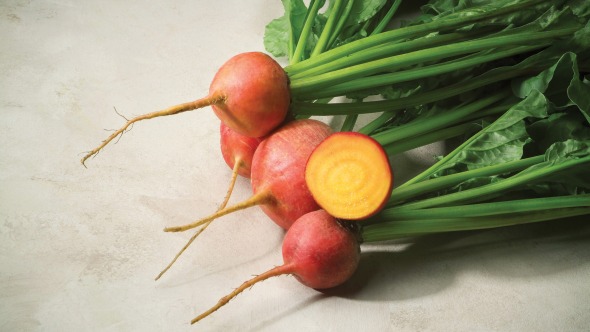Sensory Test Shows Sakata’s Golden Beet Receives Top Score

Touchstone Gold beet from Sakata Seed America receives top score in sensory test.
The latest trend on the beet scene is the golden beet, which has taken everything from juice, to salads, to side dishes by storm and provides a fun, colorful addition to produce isles and restaurant menus, according to Sakata Seed America.
Sakata’s answer to this new consumer demand is Touchstone Gold, a golden beet that exceeds expectations both in the field with yield and vigor and on the plate with bold color and sweet flavor.
“Touchstone Gold has a richer, more vibrant exterior color than competing golden beets. It holds its color better after harvest, and has a sweetness that gives it a richer flavor than the competition. These beauties are literally edible treasures,” says Laura Ann McLoud, beet breeder for Sakata.
Touchstone Gold was submitted for a third-party analysis conducted by SCS Global Services in August 2015. During this process, Touchstone Gold samples were sown, grown, and harvested in unison with top competitive varieties and beet samples yielded were tested for attributes such as color, flavor, texture, and sweetness. Trained professionals evaluated and ranked beet samples in both raw and pressure-cooked form.
Touchstone Gold beat the competition for physical characteristics including external color, uniformity, firmness, and juiciness in raw testing results, and, similarly, ranked highest in overall flavor balance in pressure cooked form. In fact, in both raw and pressure-cooked forms Touchstone Gold prevailed in overall appearance, aroma, texture, and quality, according to the company.
After Sakata’s acquisition of Alf Christianson Seed in 2002, Sakata’s beet genetics have become exponentially stronger and continue to lead the beet market in quality and innovation. The sensory analysis is just a piece of a greater Sakata initiative to further educate growers and retailers on the vast benefits of beets, and specifically Sakata varieties.
What’s next on the horizon for Sakata beets? “Sakata Seed America is very excited to be in discussion with Renee Prasad Professor from the University of the Frasier Valley on beet storage. Renee has conducted beet storage trials in British Columbia, Canada, over the past couple of years. And we are reviewing her data for our beet material,” states Delita Pardue, Sakata’s Beet Product Manager.










